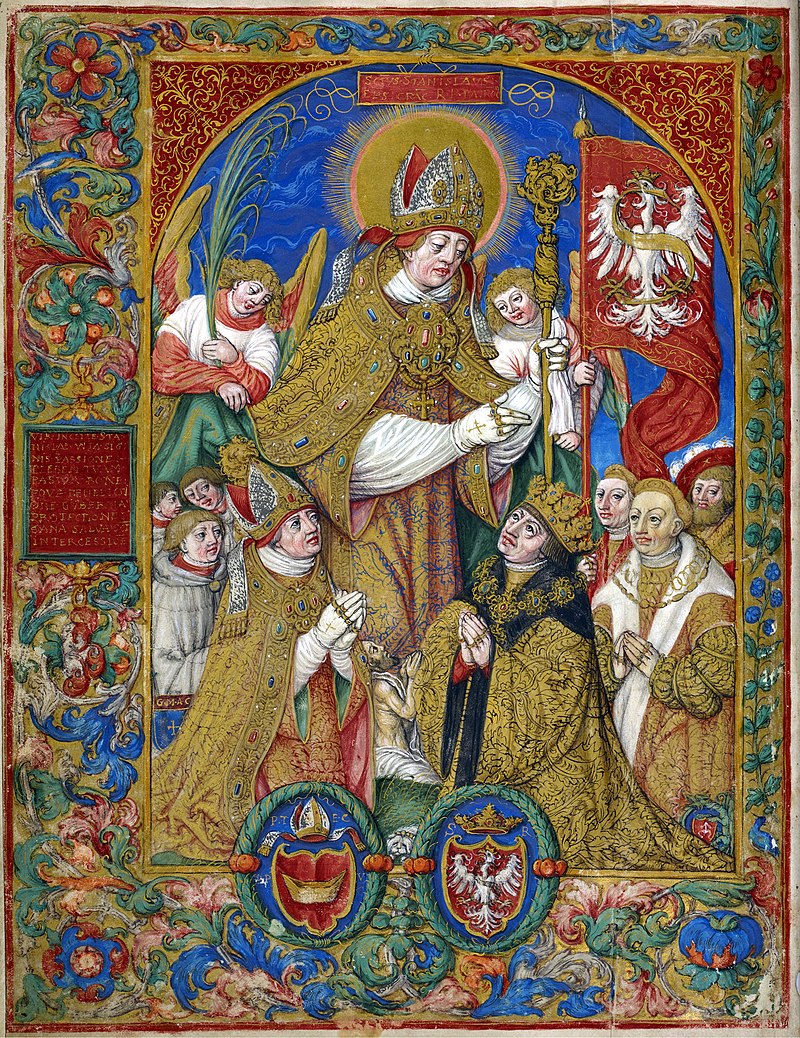Today is the traditional feast day of St Stanislas - in the Novus Ordo it is now observed on April 11th, the anniversary of his martyrdom in 1079.
There is an online account of his life and cult at Stanislaus of Szczepanów . Before looking at that I had already found this wonderful early sixteenth century image of St Stanislas, dating from 1530-35, and which is now held by the National Library of Poland.

Image:Wikipedia
| : commissioned by Piotr Tomicki, Deputy Chancellor of the Crown and Bishop of Kraków : transferred to Primate Andrzej Krzycki 1580s: transferred to Chancellor Jan Zamoyski 1810s: transferred to Library of the Zamoyski Estate |
|
| Miniature painted by Stanisław Samostrzelnik of Mogiła (Stanislaus Claratumbensis), from a manuscript copy of Catalogus archiepiscoporum Gnesnensium ("Catalogue of the Archbishops of Gniezno") and Vitae episcoporum Cracoviensium ("Lives of the Bishops of Kraków") by Jan Długosz, created in the 1530s for Bishop Piotr Tomicki of Kraków. It depicts Saint Stanislaus of Szczepanów as the patron saint of Poland, venerated by King Sigismund I and Tomicki himself together with church and secular dignitaries . Saint Stanislaus is depicted in hierachical proportion, dressed in pontifical vestments and a mitre on his haloed head. The inscription on a red plaque above reads: S[an]ctus Stanislaus Ep[iscopu]s Crac[oviensis] R[egni] P[oloniae] Patro[nus] (“Saint Stanislaus, Bishop of Kraków, Patron of the Kingdom of Poland”). He holds a crosier in his left hand and makes a blessing gesture with his right. The angels on either side of him support his cope above the figures praying below and hold the saint’s attributes: a palm branch symbolizing martyrdom and a red banner with the White Eagle intertwined with the letter “S” (King Sigismund I’s cypher) symbolizing his patronage of the Kingdom of Poland. The small figure of a naked bearded man at the saint’s feet is that of Piotr, whom – according to legend – Stanislaus resurrected, and serves as an attribute of the saint as a miracle maker. The two larger figures kneeling at the saint’s feet are King Sigismund I of Poland (right, wearing a crown and a gold chain) and Piotr Tomicki, bishop of Kraków and deputy chancellor of the Crown (left, in pontifical vestments). Below, surrounded by wreaths and with a little white dog lying on the grass in between, are two heraldic shields:
Source: Miodońska, Barbara () Miniatury Stanisława Samostrzelnika,Warsaw: Wydawnictwa Artystyczne i Filmowe, Oficyna Wydawnicza Auriga, pp. 42, 96 ISBN: 83-221-0190-2.
Source: Wikipedia
I think this is not only a splendid work in its own right but a reminder of the vitality of Court art under the later Jagiellonian Kings of Poland.
The Order of Chivalry under his patronage founded by King Stanislas II Augustus in 1765 is described in an online article at Order of Saint Stanislaus |


No comments:
Post a Comment